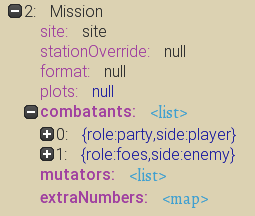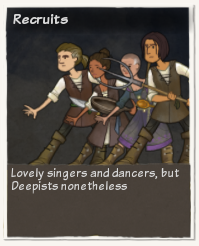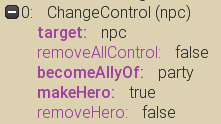Outcomes
Outcomes are things that happen! Generally, you'll be seeing these in the context of Effects. Outcomes can make a lot of things happen, usually via events and abilities. Event Outcomes usually include things like granting resources or relationship points, applying a Theme or Aspect to a hero, starting a Mission, or causing another event to happen. Ability Outcomes generally include things like making an attack roll, dealing damage, moving, adjusting stats in some way, or modifying scenery on the map.
(For some less technical descriptions, take a look at the Types of Outcomes we support. For a more general overview of how outcomes relate to other parts of Wildermyth, see the Data Format Overview)
General
All Outcomes have the following fields:
- STUB: for developer-facing documentation, or to note unimplemented but intended functionality.
- choose: Sometimes there is more than one target for a given role. If so, does this outcome apply to all targets? or one at random?
- target: Who (or what) does this outcome affect? All of the individual pieces will target this entity.
Description
Show a story dialog! This shows a story with no player choices at the end (unlike CHOICE targets, which are used to show stories with choices at the end)
- lightweight: If true and if the context is appropriate, show this content in-world instead of in a full Story Dialog. (i.e. the comic panels will be shown at the bottom of the screen instead of full-screen, like with callDownVolleyOfArrows)
- blockOtherChanges: If true, the outcomes after this won't occur until after this Description is over. Useful for cases when you want this event to grant an item or add calamities after the comic shows.
- finalButtonText: Should the final button of this comic have specific text? (By default, the final button will show "Done")
- script: The actual comic panels to show. (Edit using the comics editor)
RelationshipPoints
Adds relationship points to the given roles, or changes the relationship between roles.
- amount: The number of relationship points to grant
- who: Who to grant the relationship points to (RP is distributed evenly between all relationship pairs)
- scaling: What to multiply the amount by. None: Distribute exactly the amount of RP given. People: Multiply by the number of individuals in the given roles. Ships: multiply by the number of relationship pairs. (i.e. each relationship will get the given amount of RP)
- forceChangeRelationshipTo: Force the relationship type between individuals (for lover/rival, "who" must contain exactly two individuals)
GrantXP
Grant XP to the given target
- grantXP: The amount of XP to grant
UpgradeGear
Shows a Gear Choice popup allowing heroes to replace an existing item.
- query: Run this query on the target (hero) and offer the results to the player
- forceItemId:
- chapterModifier: Add this modifier to the chapter we pick gear for (i.e. if chapterModifier=1, the created gear will be better tier, something you would generally expect to see in the next chapter)
- allowArmor: Can the created item be armor?
- allowWeapon: Can the created item be a weapon?
- allowAugment: Can the created item be an augment?
- allowOffhand: Can the created item be an offhand?
- specificAugment: Create a specific type of augment
- element: Create an elemental weapon! This is commonly used with UpgradeGear.upgradeWeapon to turn a weapon into an elemental weapon. Note that granting an elemental weapon will always unlock that weapon group for crafting.
- chapterModifier: If not null, add this modifier to the chapter we pick gear for (i.e. if chapterModifier=1, the created gear will be better tier, something you would generally expect to see in the next chapter) (Overwrites query.chapterModifier, useful if you want to use an Expression)
- restrictTo: If not null, this item can only be given to the provided role(s)
- upgradeWeapon: The specific weapon being upgraded. This is used with upgradeFromSpirit or element to try and create a similar elemental weapon.
- upgradeFromSpirit: If this is an elemental upgrade from a spirit, this is the Role of the spirit, from which an elemental type is taken.
Mission
Starts a fight to the death. A fair amount of stuff can be specified here.
- goal: What is this fight about? Used by mission victories and followups to tell the right stories.
- combatants: Who is fighting in this Mission? By default, it's "party" against "foes", but any roles can be put in (More info below)
- combatModifiers: Add advantages or disadvantages to the player (More info below)
- site: The site this Mission is taking place at
- missionPlanOverride: Overrides the site plan (environment) that the mission takes place in (cave, forest shrine, library, etc.)
- format: Overrides the format of the mission (assault, defense, ambushed, or arena)
- musicOverride: Overrides the music played during the mission
- skipDefaultPlots: If true, don't use the regular plot based on the format - a custom plot is being used.
- mutators: Apply mutators that affect the layout of the mission in certain ways. (e.g. randomFires, closeAllDoors, forbidSpirits, etc.)
- victoryEventIds: If set, the mission victory will be one of these events (testing from first to last), or no event if none match. (The event type this links to should usually be set to OTHER)
- failureEventIds: If set, the mission failure will be one of these events (testing from first to last), or no event if none match. (The event type this links to should usually be set to OTHER)
Combatants
The people and monsters fighting in this battle.
You can set the role of a combatant and their side. You don't need to use party or foes, so if you want an event with only one player fighting, go for it. You can also put NPCs on your side, which you'll be able to control. (Even monsters! Though, maybe use with caution? It's not really supported right now?)
Use roles (instead of the above role) to group several roles into a single combatant; useful for displaying multiple roles on a single enemy card.
You can specify a customThreat, which can include a flavor and strength (if not set, they use the defaults), or you can specify specific monsterTracks.
You can add custom items to humans, either via ID or by Role. By ID is nice and easy, standard items. By Role is probably for when you want an item to have certain aspects, and you create it beforehand in the implications. In both cases, items will be equipped to the combatant for the duration of the mission. If you want a player to keep an item afterward, you can add an AddGear Outcome to manage that.
Specify a customCard if you want to override the default way the enemy shows up in cards at the start of a mission.
- role: Who is fighting?
- roles: Use this list (instead of the above role) to group several roles into a single combatant; useful for displaying multiple roles on a single enemy card
- side: What side is this role fighting for? Note that you shouldn't put a hero on the enemy side unless you actually want them to die. (For things like facing a possessed hero, use implications and set "cloneRelatedEntity" to true in the query)
- addAspects: Add aspects to this combatant for the duration of the mission
- customThreat: Contains custom options for specifying threats
- threatFlavor: If set, this will override the threat flavor, i.e. gorgons, drauven, etc.
- threatStrength: If non-zero, this will override the threat strength, i.e. how many cards are drawn
- useExtraChapterCards: Should this threat use extra cards based on what chapter it is?
- monsterTracks: If set, this threat will use the given monster cards instead of random ones. threatFlavor and threatStrength will be ignored.
- customIndividuals: Create the given individuals by ID
- customItemsById: these items (created by ID) are added to the combatant for the duration of the mission
- customItemsByRole: these items (chosen by Role) are added to the combatant for the duration of the mission
- customCard: Can be used to give specific combatants custom name and description that show up on the monster card at the beginning of the mission. (Doesn't work with threats, only specific individuals or groups)
Combat Modifiers
Add advantages or disadvantages to the player faction
- type: Should the player have an advantage, or a disadvantage?
- number: How many advantages/disadvantages should the player have? (This many will be picked randomly based on the type)
- specificModifiers: If set, these specific modifiers will override the type and number fields.
Modifiers include the following:
Advantages:
- Fortitude: All party members gain 1 temporary hitpoint
- Courage: All party members gain +1 damage/potency (3 turns)
- Cunning: Flanking attacks this combat deal +1 damage
- Intimidation: All foes suffer 2 damage to start the mission
- Insight: Double the stunt chance for all party members
- Endurance: All party members gain 1 armor and 1 warding (2 turns)
Disadvantages:
- Nausea: All party members lose 1 hitpoint.
- Disorder: Walling provides no armor this combat.
- Misalignment: All augment bonuses are nullified this combat.
- Dismay: All foes gain 1 hitpoint to start the mission.
- Wound: One party member loses half hit points to start combat.
- Disable: One party member gains stun(2) to begin combat
Some Other Notes on Missions
- If you want to fight someone from your party (as a doppelganger or possessed or whatever), don't just put the actual player on the enemy side, because then they'll actually die. Instead, make a clone of them in Implications!
MissionExtension
"HA! You thought it was over?!" -the enemies, probably
An extension to a mission. Returns to the Mission (with all heroes where they left off), generally spawning a new entity that must be defeated. (See missionVictory_jigsawPart2 for an example of use)
- createEntities: What should be spawned for this mission extension? Typically, you'll want setLocation = true, and setLocationType = closestPossible, which will spawn the entity near the target for this Outcome. (For more on creating entities, see the createEntity section)
- victoryEventIds: If set, the mission victory will be one of these events (testing from first to last), or no event if none match. (The event type this links to should usually be OTHER, so roles from this event can be injected into it)
- failureEventIds: If set, the mission failure will be one of these events (testing from first to last), or no event if none match. (The event type this links to should usually be OTHER, so roles from this event can be injected into it)
ModifyStats
Modifies an individuals stats by a value. This can be used for gameplay stats (health, injury, potency, etc.) and personality stats (bookish, snark, etc.), and can be permanent or only last for the mission or chapter.
- stat: Stat to modify
- value: How much to modify the stat by
- lifespan: How long should this stat modification last?
Aspects
Add, remove, or consume Aspects.
- addAspects: list of aspects to add/merge
- id: The id of the aspect
- value: The value to add/remove to the aspect
- merge: How should this value be added to the existing value?
- atTiles: add a templated region aspect by passing in a list of coords from a matched target
- inRelationTo: The aspect is a relationship that must be templated with an entity id. (ex: interfusedWithMystic|_ENTITY_) (See also: Aspect Parameters)
- mutual: if this aspect is in relation to another entity, also add a corresponding mutual aspect.
- consumeAspects: list of aspects to consume partially
- Same fields as addAspects
- removeAspects: list of aspects to remove entirely
- consume: Consume the aspect associated with this effect.
CopyAspects
Copies temporary advantage or disadvantage aspects from one entity to another. (Useful if you want to transform an entity into another entity, but still keep status effects etc. See thrixlBuffThrusk for an example)
- copyTo: The Role to copy temporary aspects to
AddHistory
Add History lines to this entity. This should generally be used if you want to apply permanent aspects and effects to an entity due to some event that happens.
- inlineHistory: Create a history line and add it to the target
- id: The id of the history line; should be unique!
- text: What the history line will say.
- associatedAspects: These aspects will be added along with the history line
- persistOverLegacy: Should this history line persist when you recruit a legacy hero with it?
- showInSummary: Should this history entry show up in the character sheet?
- removeAspects: If these aspects are on the entity, they will be removed.
- addHistory: Add an existing history line to the target
AddResources
Adds the given resources to the company.
- resourceName: Selects a resource type based on name (overrides resourceType, useful for if you want to pass in a resource string as a parameter to an effect)
- resourceType: The type of resource to add
- amount: How much of the resource to add
ApplyTheme
Apply a Theme or add a theme piece to an individual
- theme: The theme to apply
- piece: A specific theme piece from the given theme to apply
- historyTextKey: Key for history text associated with getting this theme, if any
- replaceInjuredLimbs: Should all injured (maimed) limbs be replaced with theme pieces, where possible?
- oneRandom: If true, grants one random theme piece
RemoveTheme
Remove a theme or specific theme piece or theme slot from an individual
- specificTheme: Theme to remove (removes full theme if specificPiece is null)
- specificPiece: Specific theme piece to remove
- clearSlot: Clear this specific theme slot of any theme pieces
DoAll
Executes all Outcomes within this
DoFirstValid
DoOneRandom
Test
IfPlayerChose
IfRolesArePresent
SetRole
IfAnyTrigger
AttackRoll
Damage
Animate
ActionPoints
GrantActionPoints
TempHP
ChangeSceneryState
ModifyOverlandTile
Trigger
Branch
BranchAbility
CreateJobAtSite
SnapshotFollowup
AllowFollowup
- See Tidings
Impact
DefenseResults
NewJob
NewPlot
Spawn
Interrupt
ChangeControl
Used to assign control of the given target to a given controller.
Using something like becomeAllyOf: party and makeHero: true will recruit the given role to your party!


